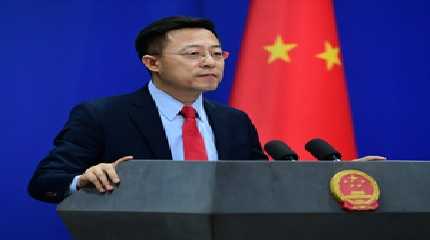
BEIJING, Jul 6 (APP): China on Wednesday appreciated arrest of key suspect involved in the terrorist attack on the Confucius Institute at the University of Karachi (CIUK) by Pakistani authorities and expressed to continue its firm support for Pakistan’s counter-terrorism efforts.
“The Chinese side pays close attention to the progress of the Pakistani side’s investigation into the terrorist attack on the Confucius Institute at the University of Karachi, and appreciates the Pakistani side’s positive efforts,” Chinese Foreign Ministry Spokesperson Zhao Lijian said during his regular briefing held here.
He said that at the same time, the Chinese side noted that further investigation was still underway.
“It is hoped that the Pakistani side will continue to make every effort to find out the truth, severely punish the perpetrators, resolutely crack down on terrorist organizations involved in the case, and ensure the safety of Chinese projects, personnel and institutions in Pakistan,” he added.
Zhao Lijian said that the Chinese side would continue to firmly support Pakistan’s counter-terrorism efforts and provide a more secure environment for China-Pakistan cooperation.
While commenting on the development, Zhu Yongbiao, a professor at the Lanzhou University’s Research Center for the Belt and Road said, for such a complex case, the Pakistani government acted quickly in terms of investigating and apprehending.
He noted that the case was not a traditional terrorist attack case, but one that involved masterminds, attack initiators, brainwashing and indirect control behind the scenes.
The ongoing threat to Pakistan’s security situation and the terrorist organization’s complex structure and operations has added difficulty to solving the case, Zhu said.
“The arrest and briefing reflect the importance the Pakistani government attaches to the security of Chinese nationals in that country,” Zhu said.
Zhu noted that the Chinese are easily seen as targets mainly because the terrorists believes that attacks on Chinese can threaten the Pakistani government they oppose, and that attacks on foreign targets are more likely to draw international backlash than attacks on local targets in an attempt to force concessions from the government.
“However, the security situation for Chinese has improved since the April case,” Zhu said. “The Pakistani government has increased its security presence, and China has increased protection, reminders and training for businesses and employees. Affected by the incident, Chinese citizens have also become more conscious of security issues.”
Zhu pointed out that the interference of external forces in Pakistan is a long-standing problem, involving multiple factors from Western countries and India.
“While strengthening the fight against terrorism, the direction of public opinion needs to be guided to avoid negative propaganda,” Zhu said.
“China will also work hard to ensure that projects invested in Pakistan can better benefit local people, so that they understand and support China-Pakistan cooperation.”
The international community should also be on the side of justice and treat counterterrorism efforts equally without double standards. Countries should stop using support for terrorism or extremism as a political tool, Zhu said.
According to reports, on July 5, Sindh provincial government and Pakistan anti-terrorism department announced arrest of a key suspect involved in the terrorist attack on Confucius in Karachi.
On April 26, a suicide attack in Karachi killed four people including three Chinese nationals, who were teaching staff at the Confucius Institute at Karachi University and a local driver.




